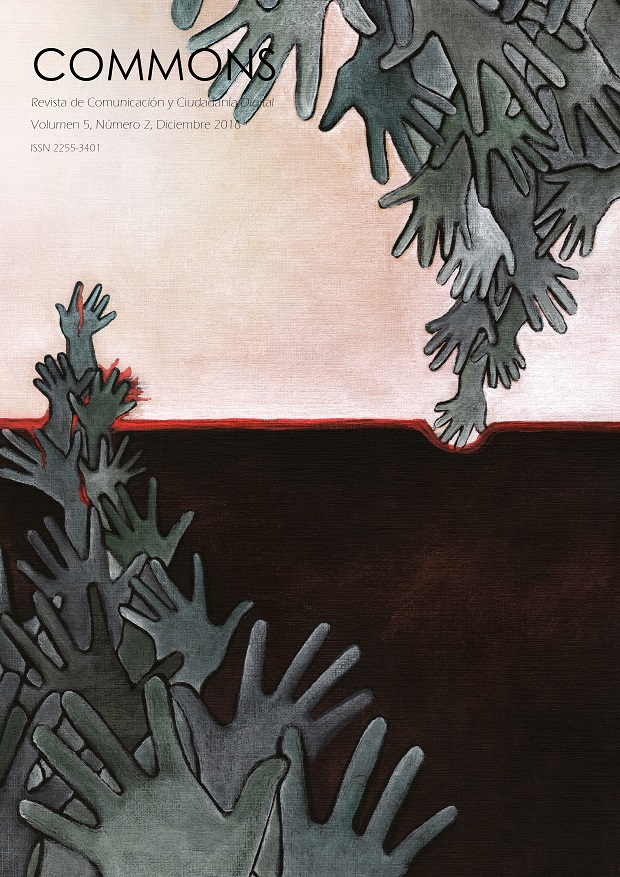Mobilization as Communication. A Latin American contribution to the study of social movements

Additional Files
Info
Abstract
Many scholars have noted the lack of interdisciplinary dialogue and research between the areas of social movements studies and that of media and communications. While social movement studies fail to fully analyse media practices and communicative processes in relation to mobilization, in media and communication the social and political aspects of mobilization are seldom taken into account when analysing communication in social movements. This apparent lack of dialogue is presented in the paper as a consequence of north-centred theorization in the fields of social movement studies and media and communication, which is addressed by spelling out the contribution of Latin American communication scholarship and a view of mobilization as anchored in communication.
Keywords
Downloads
How to Cite
License
Authors who have published with this journal accept the following terms:
- Authors shall retain their copyright and guarantee the journal the right of first publication of their work, which shall simultaneously be subject to the Creative Commons 3.0 Recognition License, which allows third parties to share the work as long as its author and first publication are indicated in this journal.
- Authors may adopt other non-exclusive licensing agreements for the distribution of the published version of the work (e.g., depositing it in an institutional telematic archive or publishing it in a monographic volume) provided that the initial publication in this journal is indicated.
- Authors are permitted and encouraged to disseminate their work via the Internet (e.g., in institutional telematic archives or on their website) before and during the submission process, which may lead to interesting exchanges and increased citations of the published work. (See The Effect of Open Access).
References
BERKIN, S. C. (2016). De los medios a los sujetos y de los sujetos al diálogo horizontal – un trayecto para abordar la comunicación. Revista Latinoamericana de Ciencias de la Comunicación, 12(23).
CUSTÓDIO L. (2016). Favela Media Activism – Political trajectories of low-income Brazilian youth. Doctoral dissertation. Tampere University Publishing.
DELLA PORTA, D., & DIANI, M. (2009). Social movements: An introduction. John Wiley & Sons.
DOWNING, J. (2008). Social movement theories and alternative media: An evaluation and critique. Communication, Culture and Critique, 1(1), 40-50.
FRANK, A. G. & FUENTES, M. (1989). Dez teses acerca dos movimentos sociais. Lua Nova: Revista de Cultura e Política, n. 17, p. 19-48.
FREIRE, P. (1982). A Pedagogia do Oprimido. Rio de Janeiro: Paz e Terra.
GAMSON, W. A. (1975) The strategy of social protest. Homewood, IL: Dorsey Press.
GARCÍA-CANCLINI, N. (2004). "Diferentes, desiguales o desconectados." Revista CIDOB D'Afers Internacionals 66-67: 113-133.
GITLIN, T. (1980). The whole world is watching: Mass media in the making & unmaking of the new left. University of California Press, 1980.
GOHN, M. G. (2012). Novas Teorias dos Movimentos Sociais. São Paulo: Edições Loyola.
____________. (Ed). (2013). Movimentos Sociais no Início do Século XXI. Petrópolis: Vozes.
GUMUCIO-DRAGON, A. (2005). Miners’ radio stations. A Unique Communication Experience from Bolivia. Media and Glocal Change. Rethinking Communication for Development. O. Hemer and T. Tufte. Goteborg, Sweden, Goteborg University, 317-324.
HARDT, M., & NEGRI, A. (2005) Multidão: guerra e democracia na era do império. Editora Record.
MARTÍN-BARBERO, J. (2003). De los medios a las mediaciones – comunicación, cultura y hegemonía. Colombia: Editorial Gustavo Gili S.A.
MELUCCI, A. (1985) The symbolic challenge of contemporary movements. Social research: 789-816.
DE MORAES, D., RAMONET, I., & SERRANO, P. (2013). Mídia, Poder e Contrapoder- da Concentração Monopólica À Democratização da Informação. Boitempo Editorial.
PAIVA, R. (2005). Mídia e Política de Minorias. In: Paiva, R and Barbalho, A. Comunicação e Cultura das minorias. Rio de Janeiro: Mauad.
_________ (2007). Para reinterpretar a comunicação comunitária. In R. Paiva (Ed.) O retorno da comunidade: os novos caminhos do social, (pp. 133-148) Rio de Janeiro: Mauad X.
REGUILLO, R. (2007). Formas del saber. Narrativas y poderes diferenciales en el paisaje neoliberal. Cultura y neoliberalismo, 91-110.
RODRÍGUEZ, C. (2011). Citizens' media against armed conflict: Disrupting violence in Colombia. U of Minnesota Press.
SADER, E. (1988). Quando novos personagens entraram em cena. Rio de janeiro: Paz e Terra.
SANTOS, B. S. (2007). Renovar a teoria crítica e reinventar a emancipação social. São Paulo: Boitempo.
SANTOS, M. (2000). Por uma outra globalização – Do pensamento único à consciência universal. Rio de Janeiro: Record (2000).
SARTORETTO, P. (2015). Voices from the margins – people, media, and the struggle for land in Brazil. Doctoral dissertation. Karlstad: Karlstad University Press.
SODRÉ, M. (2005). Por um conceito de minoria. In: Paiva, R and Barbalho, A. Comunicação e Cultura das minorias. Rio de Janeiro: Mauad.
TARROW, S. (1998). Power in Movement: Social Movements and Contentious Politics. Cambridge University Press.
TILLY, C. (1978). From mobilization to revolution. New York: McGraw-Hill.
TILLY, C., & Tarrow, S. (2006). Contentious politics. Oxford University Press.
TILLY, C. (2008). Contentious performances. Cambridge University Press.
TOURAINE, A. (1989). Palavra e sangue: política e sociedade na América Latina. Palavra e sangue: política e sociedade na América Latina. Trajetória Cultural, 19.


